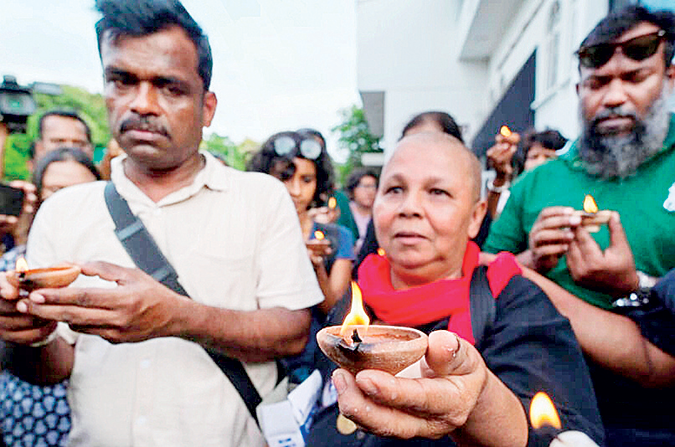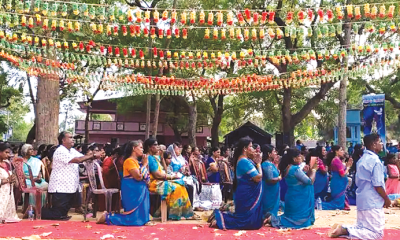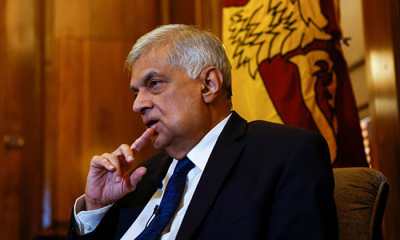News
Lanka massacres that triggered civil war haunt 40 years later

by Amal JAYASINGHE
Forty years ago, mobs in Sri Lanka burned 13 people alive, part of a week-long pogrom that turbocharged simmering ethnic unrest into all-out civil war.Known in Sri Lanka as “Black July”, the brutal violence triggered a 26-year conflict that killed about 100,000 people and set development back by decades, ending only after the Tamil rebels fighting for autonomy were massacred in 2009.
The 1983 anti-Tamil mob attacks escalated on July 29, when Mohan Panneer Selvam was just eight years old.A rampaging gang torched his home in the tea-growing central town of Hawa Eliya, burning 13 people inside, including his parents, relatives and their staff.
“My grandmother started to escape, they shot her and threw her body into the house,” Panneer Selvam said, breaking down while recalling the events narrated to him by his older sister.
He and his younger brother were away at boarding school when the riots broke out, returning as orphans to the ruins of their burned home two months later.His sister — then a child of 10 — was the sole survivor only because their mother “threw her out of the kitchen window,” he said. She was wounded and found “two or three days later” by police and sent to a camp for Tamils made homeless by the violence.
“My sister saw the burnt bodies — they put the bodies in a municipal tractor (trailer),” he told AFP. “They dumped them somewhere.”
Ethnic tensions between the mainly Buddhist Sinhalese majority and the largely Hindu and Christian Tamil minority had long simmered, and worsened after ex-colonial ruler Britain quit in 1948.The conflict erupted in July 1983, when a landmine ambush laid by Tamil rebels killed 13 Sinhalese soldiers, in the Tamil heartland of Jaffna.The government flew the bodies to Colombo for a mass burial, but relatives demanded individual funerals and rioted.
The backlash degenerated into a week of violence targeting Tamils, with the worst of the violence on July 29, dubbed “Black Friday”, when Panneer Selvam’s family was killed.According to the government, about 400 to 600 people died over the course of the massacres — mostly Tamils. But minority groups say the true toll could be in the thousands.
“The events that happened… changed the course of history,” said Tamil legislator M. A. Sumanthiran.
“We don’t regard what happened in 1983 as a riot, because it was planned violence unleashed on the Tamil people in this country. It was a pogrom.”
Some claim the army was actively involved or provided tacit support to the attacks in revenge for the loss of their 13 comrades, and several then-government officials were seen leading mobs. No one has been prosecuted.But some Sinhalese did protect Tamil neighbours.Human Rights lawyer Nimalka Fernando, who is Sinhalese, sheltered Tamil and Muslim neighbours.
“Over 40 years, it has been a journey to grapple with waves of internally displaced people, waves of refugees in my own country,” she said.
Sumanthiran said autonomy was the “political standard of the Tamil people”, noting they had always voted for a federal system — and had even demanded a separate state during elections in 1977.
“To quell that, to subdue that, violence was practised,” he said. “So ‘83 was the height of that kind of strategy by the government”
Sumanthiran says about 1.3 million Tamils fled the country after the riots, many north to neighbouring India — motivating their increasing interest in the conflict.New Delhi pressed Colombo to seek peace by granting autonomy to the Tamils, and the Sinhalese leaders’ policy “boomeranged” back in their faces, he added.
“While everything was on fire, the Indian government intervened,” Sumanthiran said.Of the estimated 100,000 killed in the war, the dead are split roughly equally between the security forces, Tamil fighters and Tamil civilians, with Sinhalese and Muslims also among the dead.
The physical scars of the war fade, and only a few of the battle-scarred buildings remain. But the legacy of events 40 years ago lives on.Today, Sumanthiran said many Tamils still dream of political autonomy.
“Successive governments after the war ended have been successful in sort of delaying it — promising and not doing,” he said. “But I don’t think they can do that for too long”.
News
US sports envoys to Lanka to champion youth development

The U.S. Embassy in Colombo welcomed the U.S. Sports Envoys to Sri Lanka, former National Basketball Association (NBA) and Women’s National Basketball Association (WNBA) players Stephen Howard and Astou Ndiaye, from June 8 through 14.
The Public Diplomacy section of the U.S. Embassy said that it would launch a weeklong basketball program intended to harness the unifying power of sports, made possible through collaboration with Foundation of Goodness and IImpact Hoop Lab.
While in Sri Lanka, Howard and Ndiaye, both retired professional basketball players, will conduct a weeklong program, Hoops for Hope: Bridging Borders through Basketball. The Sports Envoys will lead basketball clinics and exhibition matches and engage in leadership sessions in Colombo and Southern Province for youth aged 14-18 from Northern, Uva, Eastern and Western Provinces, offering skills and leadership training both on and off the court. The U.S. Envoys will also share their expertise with the Sri Lanka Basketball Federation, national coaches, and players, furthering the development of basketball in the country. Beyond the clinics, they will collaborate with Sri Lankan schoolchildren to take part in a community service project in the Colombo area.
“We are so proud to welcome Stephen and Astou as our Sports Envoys to Sri Lanka, to build on the strong people-to-people connections between the United States and Sri Lanka,” said U.S. Ambassador Julie Chung. “The lessons that will be shared by our Sports Envoys – communication, teamwork, resilience, inclusion, and conflict resolution – are essential for leadership development, community building, equality, and peace. The U.S. Sports Envoy program is a testament to our belief that sports can be a powerful tool in promoting peace and unity.”
News
Rahuman questions sudden cancellation of leave of CEB employees

SJB Colombo District MP Mujibur Rahuman in parliament demanded to know from the government the reasons for CEB suspending the leave of all its employees until further notice from Thursday.
MP Rahuman said that the CEB has got an acting General Manager anew and the latter yesterday morning issued a circular suspending leave of all CEB employees with immediate effect until further notice.
“We demand that Minister Kanchana Wijesekera should explain this to the House. This circular was issued while this debate on the new Electricity Amendment Bill was pending. There are many who oppose this Bill. The Minister must tell parliament the reason for the urge to cancel the leave of CEB employees,” the MP said.However, Speaker Mahinda Yapa Abeywardena prevented Minister Wijesekera responding to the query and said that the matter raised by MP Rahuman was not relevant.
News
CIPM successfully concludes 8th Annual Symposium

The Chartered Institute of Personnel Management (CIPM) successfully concluded the 8th Annual CIPM Symposium, which took place on 31st May 2024. Themed “Nurturing the Human Element—Redefining HRM in a Rapidly Changing World,” the symposium underscored the pivotal role of human resource management (HRM) in today’s dynamic global landscape. Since its inception in 1959, CIPM has been dedicated to advancing the HR profession through education, professional development, and advocacy, solidifying its position as Sri Lanka’s leading professional body for HRM.
Ken Vijayakumar, the President of the CIPM, graced the occasion as the chief guest. The symposium commenced with the welcome address by the Chairperson, Prof. Arosha Adikaram, followed by the Web Launch of the Symposium Proceedings and Abstract Book by the CIPM President. The event featured distinguished addresses, including a speech by Chief Guest Ken Vijayakumar, President of CIPM, and an address by Guest of Honor Shakthi Ranatunga, Chief Operating Officer of MAS Holdings Pvt. Ltd., Sri Lanka.
The symposium also featured an inspiring keynote address by Prof. Mario Fernando, Professor of Management and Director of the Centre for Cross Cultural Management (CCCM) at the University of Wollongong, Australia.
Vote of Thanks of the inauguration session was delivered by Dr. Dillanjani Weeratunga, Symposium Co-chair.
The symposium served as a comprehensive platform for researchers to present their findings across a wide range of critical topics in HRM. These included Cultural Diversity and Inclusion, Talent Development and Retention, Ethical Leadership and Corporate Social Responsibility, Adapting to Technological Advancements, Mental Health and Well-being at Work, Global Workforce Challenges, Employee Empowerment, and Reskilling and Upskilling.
The plenary session was led by Prof. Wasantha Rajapakse. Certificates were awarded to the best paper presenters during the valedictory session, followed by a vote of thanks delivered by Kamani Perera, Manager of Research and Development.
The annual symposium of CIPM was a truly inclusive event, attracting a diverse audience that spanned undergraduates, graduates, working professionals, research scholars and lecturers. This widespread interest highlights the symposium’s significance in the field of HRM, offering a unique opportunity for everyone to network and learn from scholarly brains.The CIPM International Research Symposium was sponsored by Hambantota International Port, Sri Lanka Institute of Information Technology (SLIIT), E B Creasy & Co. PLC, and Print Xcel Company.
















